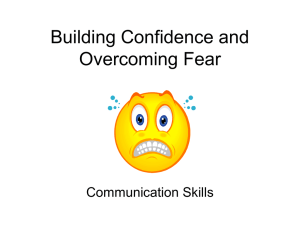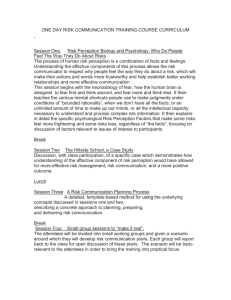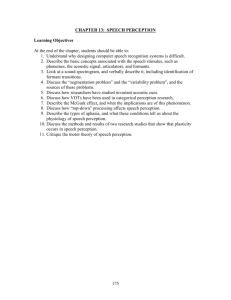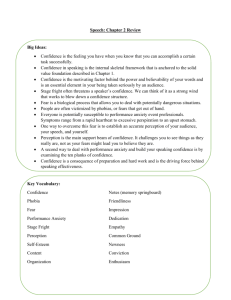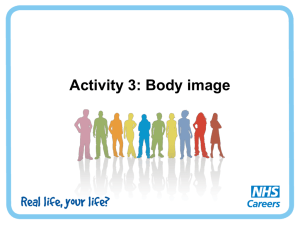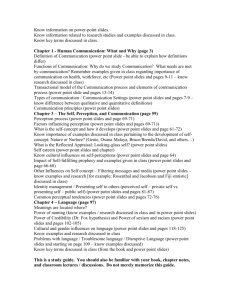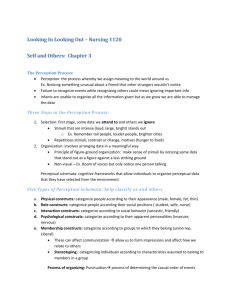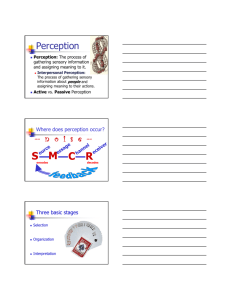Communication Apprehension – Overcoming our Fear of
advertisement
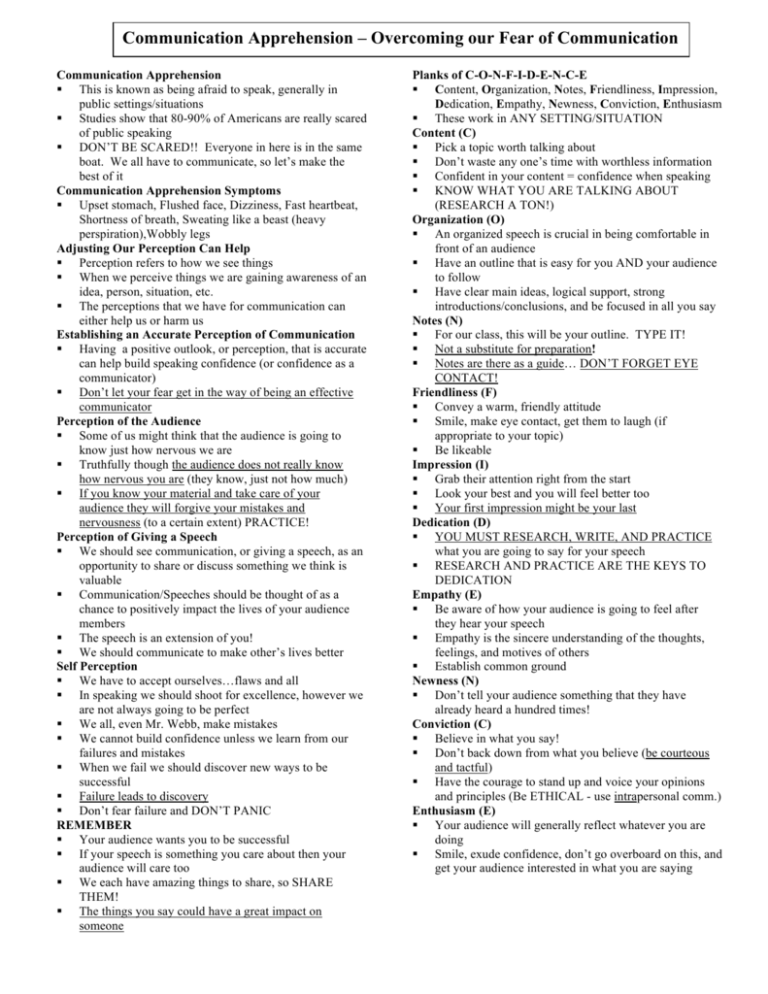
Communication Apprehension – Overcoming our Fear of Communication Communication Apprehension This is known as being afraid to speak, generally in public settings/situations Studies show that 80-90% of Americans are really scared of public speaking DON’T BE SCARED!! Everyone in here is in the same boat. We all have to communicate, so let’s make the best of it Communication Apprehension Symptoms Upset stomach, Flushed face, Dizziness, Fast heartbeat, Shortness of breath, Sweating like a beast (heavy perspiration),Wobbly legs Adjusting Our Perception Can Help Perception refers to how we see things When we perceive things we are gaining awareness of an idea, person, situation, etc. The perceptions that we have for communication can either help us or harm us Establishing an Accurate Perception of Communication Having a positive outlook, or perception, that is accurate can help build speaking confidence (or confidence as a communicator) Don’t let your fear get in the way of being an effective communicator Perception of the Audience Some of us might think that the audience is going to know just how nervous we are Truthfully though the audience does not really know how nervous you are (they know, just not how much) If you know your material and take care of your audience they will forgive your mistakes and nervousness (to a certain extent) PRACTICE! Perception of Giving a Speech We should see communication, or giving a speech, as an opportunity to share or discuss something we think is valuable Communication/Speeches should be thought of as a chance to positively impact the lives of your audience members The speech is an extension of you! We should communicate to make other’s lives better Self Perception We have to accept ourselves…flaws and all In speaking we should shoot for excellence, however we are not always going to be perfect We all, even Mr. Webb, make mistakes We cannot build confidence unless we learn from our failures and mistakes When we fail we should discover new ways to be successful Failure leads to discovery Don’t fear failure and DON’T PANIC REMEMBER Your audience wants you to be successful If your speech is something you care about then your audience will care too We each have amazing things to share, so SHARE THEM! The things you say could have a great impact on someone Planks of C-O-N-F-I-D-E-N-C-E Content, Organization, Notes, Friendliness, Impression, Dedication, Empathy, Newness, Conviction, Enthusiasm These work in ANY SETTING/SITUATION Content (C) Pick a topic worth talking about Don’t waste any one’s time with worthless information Confident in your content = confidence when speaking KNOW WHAT YOU ARE TALKING ABOUT (RESEARCH A TON!) Organization (O) An organized speech is crucial in being comfortable in front of an audience Have an outline that is easy for you AND your audience to follow Have clear main ideas, logical support, strong introductions/conclusions, and be focused in all you say Notes (N) For our class, this will be your outline. TYPE IT! Not a substitute for preparation! Notes are there as a guide… DON’T FORGET EYE CONTACT! Friendliness (F) Convey a warm, friendly attitude Smile, make eye contact, get them to laugh (if appropriate to your topic) Be likeable Impression (I) Grab their attention right from the start Look your best and you will feel better too Your first impression might be your last Dedication (D) YOU MUST RESEARCH, WRITE, AND PRACTICE what you are going to say for your speech RESEARCH AND PRACTICE ARE THE KEYS TO DEDICATION Empathy (E) Be aware of how your audience is going to feel after they hear your speech Empathy is the sincere understanding of the thoughts, feelings, and motives of others Establish common ground Newness (N) Don’t tell your audience something that they have already heard a hundred times! Conviction (C) Believe in what you say! Don’t back down from what you believe (be courteous and tactful) Have the courage to stand up and voice your opinions and principles (Be ETHICAL - use intrapersonal comm.) Enthusiasm (E) Your audience will generally reflect whatever you are doing Smile, exude confidence, don’t go overboard on this, and get your audience interested in what you are saying

